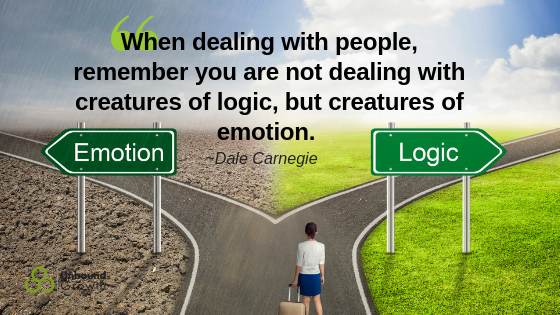
Objections are one of those things that we all encounter as salespeople, within every conversation that we have. How we handle them varies. Few do it well. Even fewer are able to turn objections into value-add statements and questions.
And like most things in sales, handling objections takes a framework that you can customize to each conversation, and practice the hell out of until it becomes second nature.
Check out the video for how I coach salespeople to handle objections, or read the 4 part framework.
The Framework Of Handling Objections
The framework for handling objections is similar to the one you use to ask questions of buyers and the one you use to re-frame a buyer's negative perception- actually go hand in hand.
What many tend to do when they hear objections, is to defend their position with all sorts of facts and data to try and overcome the objection with logic. (Like the prospect can somehow be reasoned out of their insanity.)
Unfortunately most objections don't come from logic. We buy based on emotions. We also come up with objections based on emotions. All the facts and logic does is cause the salesperson to get into a debate, and sometimes an argument, with their prospect.
(This is also typically where the salesperson will be proud of themselves for "challenging their customer.")
Show Empathy
Instead, show some empathy. Show that you understand their objection. Simply by saying things like; "You know? I totally understand how you feel. I might feel the same way." Or, "Say, you know what? You're right, there is a lot of risk in this. That's why we have X, Y, and Z resources in place, to make sure that you're successful."
Don't try to overcome their objections with logic which to them sounds like their objections aren't valid and that they're stupid for having them.
Ask More Clarifying Questions
Next, if you haven't already guessed, the next step to overcoming objections, and eliminating them, is to ask more clarifying questions. When we hear objections as salespeople, we tend to get emotionally involved in the response. Either because we don't know how to answer or we're afraid of the rejection that will happen if this deal doesn't close.
Or we have this need for approval, that we want them to think that we're smart and that everything we say, they're gonna agree with.
And that gets in in the way of asking those all important questions.
You can overcome that hidden weakness by recognizing it and deliberate practice by asking clarifying questions when you get an objection with a peer, or a coach. Some examples might be:
"What do you mean by that?"
"Can you tell me a little bit more about that?"
"Why do you feel that way?"
When you ask simple and open-ended questions, you can isolate what the real objection is, so that you can then address and re-frame it.
You can now find ways to actually minimize whatever that objection is or whatever their perceived risk is. Questions like, "What if we could help you to reduce your sales cycle by 50%? How would that impact your revenue?" And help paint a picture for them, of what a future might look like. To help reduce that negative and risk averse that they have.
Once you've done that, don't be afraid to ask again. One of the ways that I like to overcome objections is asking three other clarification questions. "Do you believe that I understand what you're going through? Do you believe that I have the expertise and solution to help? And do you want my help?" Don't be afraid to ask again.
Have An Alternative Ready
Finally, when all is said and done, if you still aren't able to overcome, or eliminate, that ultimate objection, have an alternative. Have a smaller commitment that they can take, that might make it easier for them and make it seem less risky.
For example,let's say you have a 12 month commitment, consider offering a proof of concept, trial or a pilot, with set outcomes and objectives and KPIs that determine if that's successful and what the next steps in moving into a longer engagement is going to be.
The Key: Micro-Commitments
The key to all of this is get micro-commitments as you're going through the sales process. Always have what the next steps are.
Also, look at things like the words that you're using. How fast are you speaking? What body language and eye contact are you using? All of these are things that are going to help to build trust, which are the things that are going to help you to get past objections.
Objections will happen, so be prepared and you won't be caught off guard. Don't try to eliminate by disagreeing with them, but actually empathize with them. And don't think that they just happened at the close, objections are happening throughout your sales process, if you are actually listening for them and not ignoring them. (Because sometimes we try to ignore the things we don't want to deal with.)





